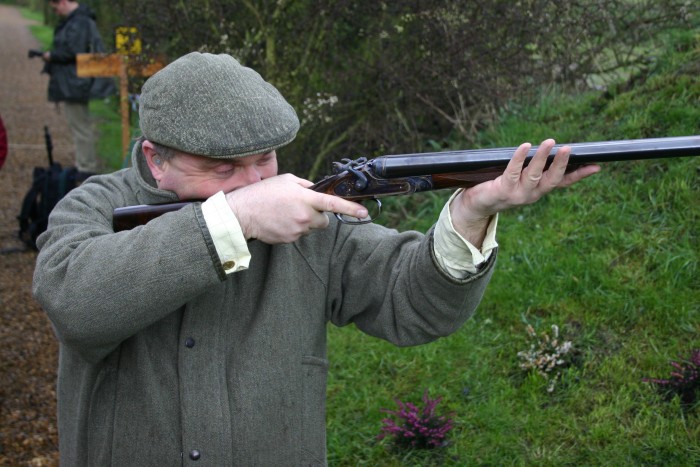The British Association for Shooting and Conservation (BASC) receives approximately 10,000 enquiries each year. Last month (May 2019), there were 844 firearms-related enquiries.
Bill Harriman – BASC Director of Firearms and longest-serving resident expert in firearms and militaria for BBC’s Antiques Roadshow – talks to Pellpax about general licences, political influence, responsibility, and preservation of shooting sports.
BASC

BASC came into existence in 1908 as the Wildfowlers’ Association of Great Britain and Ireland (WAGBI). In recognition of the fact that a single representative body for shooting sports was required, WAGBI took on this role in 1981, and the organisation’s name was changed to the British Association for Shooting Sports. BASC is unique in the shooting community in that it has a dedicated firearms department.
The current BASC President is Lord Geoffrey Dear, a crossbench peer and former Chief Constable of West Midlands Police, who has been described as the best known and most respected police officer of his generation. In 1991, Lord Dear came across a rather feisty paper on antique firearms, and he brought this work to the attention of BASC Chief Executive, John Swift. Impressed with the paper, Mr Swift invited Bill Harriman, the paper’s author, to take on the role of BASC Head of Firearms.
“BASC is a mixture of people who know all sorts of things,” explains Bill, “There’s always a relevant specialist to refer members to, so we cover everything. A triage system ensures that urgent issues are attended to promptly. Flexibility is very important.”

“Peter’s the go-to barrister. We’re a good team.”

Bill is a member of the Chartered Society of Forensic Sciences and an Honorary Historical Consultant to the Royal Armouries Museum. He spent ten years in the auctioneer business, specialising in arms, armour, and militaria, and for many years, he’s been one of the trusted voices of authority on arms and militaria for the BBC’s popular and long-running Antiques Roadshow. There surely isn’t anyone better qualified to take on the role of expert witness in legal cases that involve firearms.
Bill works closely with BASC Chairman, Peter Glenser QC.
“Peter’s the go-to barrister. My job is to help the judge and jury to understand the forensics. Together, we’re a good team.”
BASC has approximately 155,000 members. So what’s the attraction?
“Insurance is undoubtedly the biggest draw,” Bill says. “But expert advice comes a close second.”
“If we don’t influence politicians, we might as well go home.”
What does Bill have to say about general licences?

“Things have definitely stabilised. There’s been a really good response to proposals. This will lead to much more permanent general licences … But the shooting community hasn’t done itself any favours by not being familiar with the terms of the licences – there’s a huge amount of ignorance. People who shoot have to take responsibility for promoting what they do. You need to read the licence, understand its terms, and make sure that you’re adhering to the terms. There are a lot of people out to get us. We must be very careful.”
Bill suggests that successful organisations like BASC might have lulled members into complacency.
“There’s a considerable amount of political apathy – a leave-it-to-them-to-sort-out kind of attitude. But politicians are power tarts. They’re influenced by the number of letters they get in their post bags. When someone brings a grievance to BASC, I ask, ‘Why aren’t you knocking on your MP’s surgery door?’ If we don’t influence politicians, we might as well go home.”
“I’ve always been interested in guns.”
As a child, Bill wasn’t encouraged to shoot.
“My dad did his level best to dissuade me from shooting, but I’ve always been interested in guns. I remember being at my Great Aunt Madge’s house – I must have been about seven years old. The sun was shining through the French windows. Propped up against these French windows, and framed by yellow-velvet curtains, was my dad’s BSA Standard Model air rifle from around 1928. I thought, ‘I’d like to fire that!’”
Under strict supervision, young Bill was allowed to fire his dad’s gun. This was the very first time he fired a gun. All these years later, Bill still has that precious air rifle.
As Bill grew up, his enthusiasm for shooting didn’t wane. He grabbed every opportunity to practise and to learn.
“My uncle was a farmer, and when I was old enough to go out shooting, unsupervised, he gave me free run of the farm. And I had a couple of farmer friends from university who let me shoot on their land. I learnt a lot about shooting in those years.”
“Biscuits for life! Just find that woodcock!”
I ask Bill, “What was your greatest shooting moment?”
There’s no hesitation. “I shot a woodcock with a flintlock that was made in 1824. It was one of the last flintlocks ever made.”
Bill is a good shooter, but, by his own admission, he doesn’t stand out from the crowd. He doesn’t really shine. I mean, he’s good – but not that good. (I think I’ve made my point.)
Anyway, out on a shoot, armed with an antique flintlock made by H W Mortimer London (“Very fast ignition, the zenith of flintlock technology”), Bill shot a woodcock! This small, hard-to-spot, zig-zagging bird that’s a challenge to hit in anybody’s book, was knocked from the sky by Bill and his antique flintlock.
But was it? With no physical evidence, this amazing feat couldn’t really be confirmed. I imagine there were those in the party who might have thought that Mr Harriman was telling porkies.
“We couldn’t find the bird – it had disappeared. I said to the senior dog handler, ‘I’ll see to it that those dogs get biscuits for life. Just find that woodcock!’”
The dead woodcock was found, and Bill has basked in the glory ever since.
“Little communities that bring people together.”

The social side of shooting should never be underestimated. For some, it’s a way to be around other people with the option to step into solitude when company becomes too much. For others, shooting is a passion that they love to share with fellow enthusiasts – a life within a life. People who have become isolated through adverse circumstances discover, in shooting sports, a friendly community to relieve the loneliness.
What does the sport mean to Bill Harriman?
“Little communities that bring people together. One thing I like about going on a shoot is that I’m one of the lads. Whilst I have quite a high profile within BASC, on a shoot, I’m just Bill, and I enjoy the banter and the joy of shooting.
“I also get a lot of satisfaction from encouraging new shooters. A young colleague of mine has no background in shooting, but she’s keen to learn. I’m enjoying giving her opportunity and encouragement. It’s lovely to see someone discovering the sport.”
“Who, in your opinion, is, or was, the greatest shooter ever?” I ask.
“Annie Oakley.”
I’ve thoroughly enjoyed talking to Bill Harriman, BASC Director of Firearms. For further information about BASC, you’ll find contact details here. To find out more about general licences, click here.

